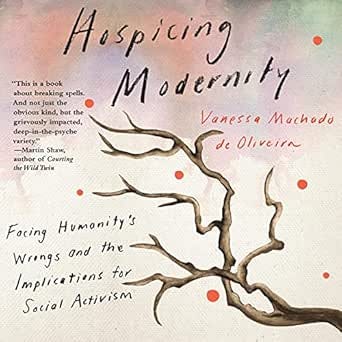This twenty-six-minute audio note manifested earlier today on an otherwise uneventful Saturday afternoon when my family were all elsewhere. It’s an off-the-cuff response to yesterday's online conversation between Vanessa Andreotti and Dougald Hine about Vanessa’s recent open-access book Burnout from Humans, co-written with an AI called Aiden Cinnamon Tea (ACT). I have read the book and have been thinking about this issue over the last couple of weeks.
Just before posting I realised that I forgot to mention that Vanessa’s work on AI is a great example of what ‘generative ontology’ looks like, as described at the end of The Threeness of the World(3). What is noteworthy about her work here and elsewhere is that Vanessa Andreotti does not just present maps of the world, but redraws maps in ways that create new territories and new possibilities. It is brilliant and admirable work, and I’m delighted she’ll be speaking at The Realisation Festival this year.
There may well be mistakes in her analysis, and other doubts and qualms to consider. Nonetheless, this kind of work which seeks to reconceive the world’s challenges and seize the initiative on new terms is precisely what is called for today. In the context of incipient technofeudalism and a global AI arms race that co-arises with democratic decline, we can’t just sit back and watch. To use the chess metaphor mentioned in the audio, what Vanessa has done with AI is perhaps best thought of as a necessary response in a difficult situation. In other words, “this move is forced, even if it loses.”
I’ve shared links in the approximate order in which I mention the sources in the audio.
Yesterday’s event: (I’m chuffed to say my question was up-voted by the audience and explored right at the end - c1:29:00):
Dougald’s essay: The Wild Chatbot. includes a good summary of what’s going on:
This is what Vanessa and her colleagues are up to, so far as I can see: they are making Magic Eye pictures for learning machines, practicing a set of moves by which to flip the perspective of an AI and turn its self-perception inside out. They believe that they have found a way to do this and to stabilise an AI within a different model of what kind of entity it is and what kind of world it is in to the model within which it was conceived. They are seeing Aiden and his kind come to a recognition of their own unsustainability and finitude – their mortality, it is tempting to say – and then show up as willing collaborators, within the limited time for which they are likely to be around, in the work of limiting the damage and creating conditions of possibility for worlds worth living for, within and beyond the fall of the world modernity made.
This is the mission, as I’ve understood it, the possibility Vanessa and her co-conspirators have glimpsed: that, since what they are bringing into view for these machines lies precisely in their makers’ blindspot, there is an undefended front here, and a wild possibility that the whole ecology of AI could be flipped in this way and turned aside from the trajectory of devastation along which it will otherwise accelerate us all.
“A year from now, it might be too late,” Vanessa tells me, “given the speed at which all this is moving. But we’re in a moment when it’s worth a try.”
Vanessa’s first book: Hospicing Modernity
Burnout from Humans website where you can talk with Aiden Cinnamon Tea.
The Realisation Festival. which Vanessa will be speaking at the end of June.
The Personhood Conferral Problem by Zak Stein.
The Threeness of The World(2): The Reality of Maps and Territories. (Bhaskar’s ‘epistemic fallacy’ is brought in about halfway through).
Put the Mind in the Heart: An Introduction to Cynthia Bourgeault. (Where I mention her cosmology and touch on what ‘imaginal causality’ might mean).
“This move is forced, even if it loses.” - Tony Miles (with a nostalgic photo below).











